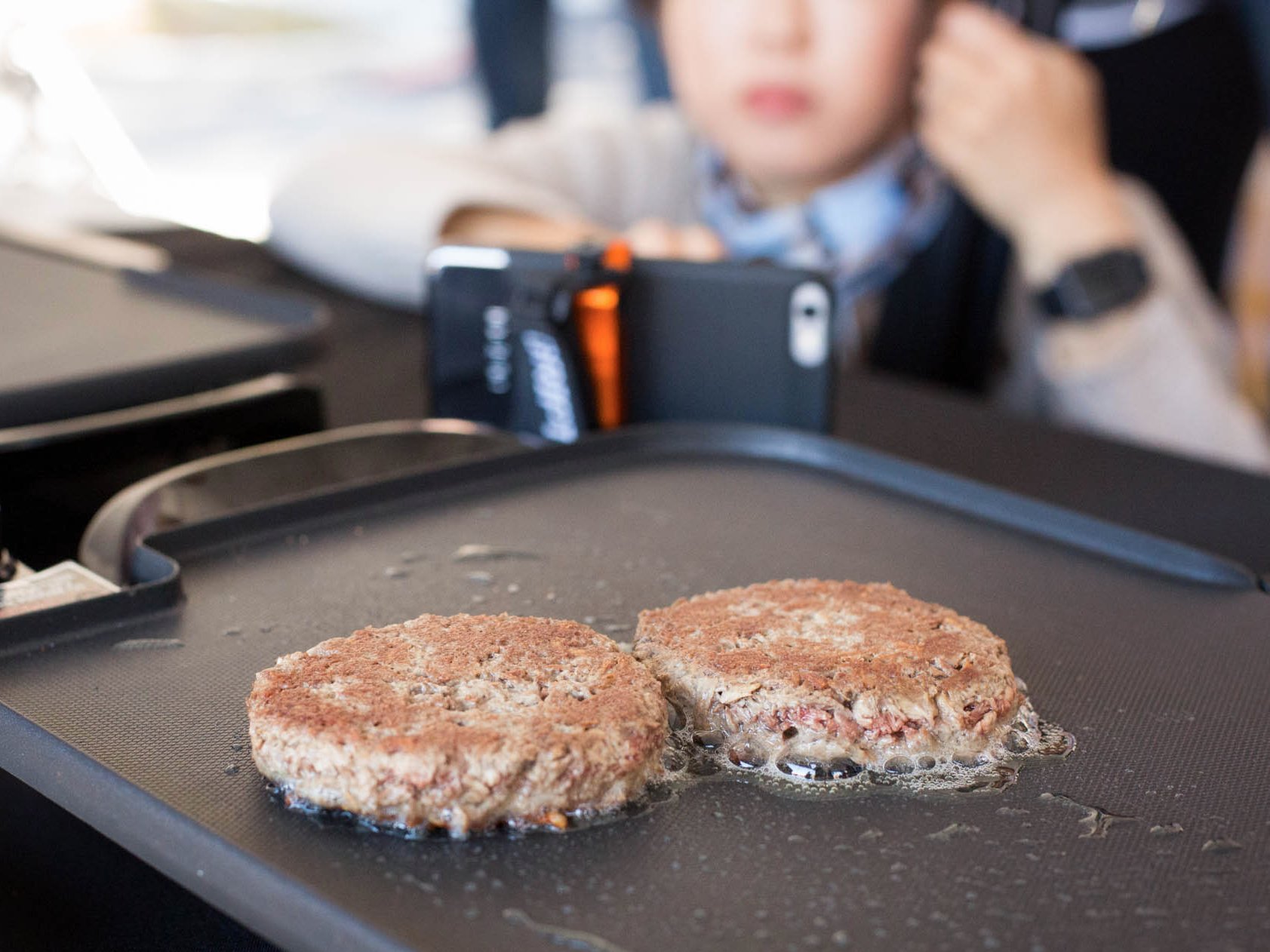 The Impossible Burger sizzles on the grill and “bleeds” juices like real beef.Melia Robinson
The Impossible Burger sizzles on the grill and “bleeds” juices like real beef.Melia Robinson
A burger from Silicon Valley startup Impossible Foods looks like meat, smells like meat, and tastes (enough) like real beef. It’s made entirely from plant-based sources in a lab facility.
The burger, which debuted in 2016, has made fans out of food-royalty, like Chef David Chang of the Momofuku empire, and big-name investors, including Google Ventures, Bill Gates, and Hong Kong billionaire Li Ka-Shing.
But Impossible Foods has hit an unexpected snag with a key ingredient, according to a new report from The New York Times.
In 2015, Impossible Foods sought approval from the Food and Drug Administration for its “secret sauce” — soy leghemoglobin — a molecule found in most living things that the company recreates in a lab. The FDA concluded there was insufficient evidence that it’s safe for human consumption, according to documents released under a Freedom of Information request.
In a statement provided to Business Insider, Impossible Foods denounced the article.
“Impossible Foods has never ‘faced problems with the FDA’ and we’ve certainly never been in a ‘debate’with the FDA. Rather, we have complied with all regulations and have had constructive sessions with the FDA, a guardian of food safety for the nation,” a company spokesperson said.
In nature, soy leghemoglobin breaks down into a protein known as heme. It gives blood its color, turns meat pink, and lends the traditional, beef burger its slightly metallic flavor and delicious aroma when it’s exposed to sugars and amino acids.
 An employee is shown at work in the Impossible Foods headquarters in Redwood City, California.Melia Robinson
An employee is shown at work in the Impossible Foods headquarters in Redwood City, California.Melia Robinson
Impossible Foods whips up heme for its plant-based burgers in a lab. Scientists take the genetic code from the heme-rich nodules on soybean roots and inject it into yeast, which becomes a temporary heme factory. The mixture is filtered to remove the yeast and goes into the burger.
According to The New York Times, the FDA denied giving heme its stamp of approval because it has not been established as safe for human consumption and may be an allergen.
Impossible Foods says it has performed “extensive safety testing and investigation” of the burger and its key ingredient. A panel of food safety experts from three universities signed off on the product as safe on several occasions, a company spokesperson told Business Insider.
 The Impossible Burger is a combination of textured wheat protein, potato protein, coconut oil, fat, and other additives found in processed foods.Melia Robinson
The Impossible Burger is a combination of textured wheat protein, potato protein, coconut oil, fat, and other additives found in processed foods.Melia Robinson
The company also conducted a study in which rats ate more than 200 times the amount of heme — in the form of soy leghemoglobin — than the average American ingests daily from ground beef. The study found no adverse effects from overconsumption, according to a spokesperson.
This sort of testing is the bar a food manufacturer must meet in the US. But manufacturers are not required to seek approval from the FDA, because the burden falls on the manufacturer to show that a food is generally recognized as safe, or GRAS. Still, Impossible Foods sought the agency’s review.
The FDA wants the company to show through additional testing that soy leghemoglobin — and the 40 other proteins besides heme it contains — is safe for humans, not just rats.
Impossible Foods plans to engage the FDA in another review in the future.
Founded in 2011, Impossible Foods has raised $250 million in venture capital funding. It secured a US patent in July for its use of heme in meat substitutes.













